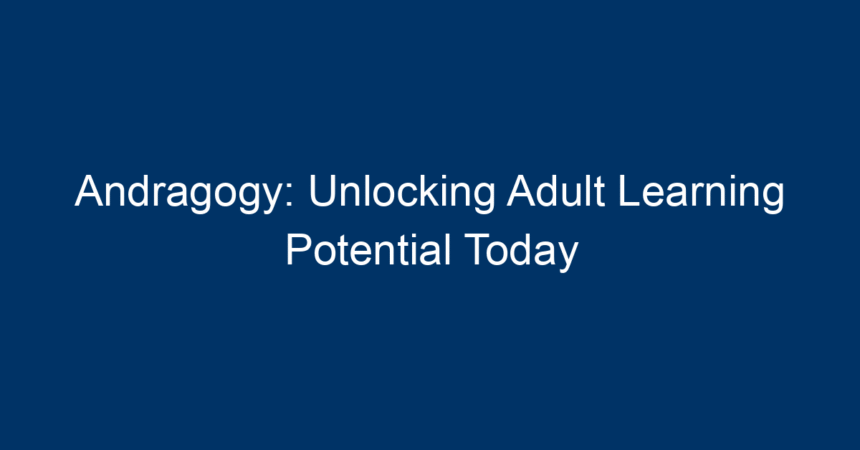In a rapidly changing world, continuous learning has become an essential skill for adults seeking personal and professional growth. Understanding andragogy—the art and science of adult learning—empowers educators, trainers, and learners alike to unlock the potential within adult learners. This article explores the fundamental principles of andragogy, its practical applications, and actionable strategies for enhancing the adult learning experience.
What is Andragogy?
Andragogy is derived from the Greek word "aner," meaning man, and "agogus," meaning leader. Coined by Malcolm Knowles in the 20th century, andragogy refers specifically to methods and principles used in adult education. Unlike traditional pedagogy, which focuses on children and emphasizes rote memorization, andragogy is learner-centered, recognizing that adults bring unique experiences, motivations, and learning styles.
The Importance of Andragogy
The significance of andragogy extends beyond its foundational concepts; it offers a framework for tailoring educational experiences to meet the needs of adults. Understanding andragogy can lead to improved engagement, retention, and application of knowledge. With a focus on self-directed learning, established competencies, and real-world applications, adult learners can bridge the gap between theory and practice.
The Principles of Andragogy
1. Self-Directed Learning
One of the core principles of andragogy is the belief that adults are inherently self-directed learners. Unlike children, who often rely on instructors for guidance, adults take more responsibility for their learning. This principle emphasizes the importance of providing opportunities for learners to set their own goals, select resources, and evaluate their progress.
2. Life Experiences as a Resource
Adults come to learning experiences with a wealth of life experiences that can enhance their understanding. Andragogical practices encourage drawing upon these experiences, allowing learners to connect new information with their prior knowledge. This not only enriches the learning process but also fosters a more engaging and meaningful learning environment.
3. Readiness to Learn
Adult learners are often motivated by specific needs—whether it’s advancing in their careers, enhancing personal skills, or fulfilling a desire for knowledge. Understanding the readiness to learn helps educators design curricula that meet immediate needs, making the learning experience relevant and timely.
4. Problem-Centered Approach
Adults prefer to learn in a problem-centered fashion rather than in a content-oriented manner. This means that lessons built around real-life challenges or case studies are generally more effective. By focusing on practical applications and solutions, learners are more likely to engage and retain what they learn.
5. Intrinsic Motivation
While adults can be motivated by external factors, intrinsic motivation often plays a more significant role in adult learning. A sense of achievement, personal growth, and self-efficacy fuel their commitment to learning. Educators can capitalize on this by fostering an environment that encourages exploration and celebrates learners’ self-improvement.
Implementing Andragogic Principles in Educational Settings
1. Create a Collaborative Learning Environment
Fostering collaboration among learners can enhance the andragogical process. Encourage discussions, group projects, and peer teaching. This not only builds a sense of community but also allows adults to share their experiences and learn from one another.
2. Utilize Technology and Multimedia
In today’s digital age, incorporating technology can significantly boost adult learning. Online resources, webinars, and multimedia presentations can provide various avenues for learning, addressing different styles and preferences. Consider using mobile apps for learning, online forums for discussion, and video tutorials to enhance understanding.
3. Offer Flexible Learning Opportunities
Flexibility is essential to accommodate the busy lives of adult learners. Providing options for asynchronous learning, such as recorded lectures or self-paced modules, allows individuals to learn at their convenience. This adaptability ensures that learning can fit into their schedules seamlessly.
4. Design Relevant Assessments
Assessment methods should reflect real-world applications. Use project-based assessments, simulations, or practical demonstrations that mirror the challenges adults face in their personal or professional lives. This relevance not only boosts engagement but also enhances knowledge retention.
5. Foster a Growth Mindset
Encouraging a growth mindset—believing that abilities can be developed through dedication and hard work—is vital for adult learners. Create an environment where mistakes are seen as stepping stones to growth. Feedback should be constructive, promoting resilience and continuous learning.
Challenges in Andragogy
While andragogy provides a solid foundation for adult education, educators may face challenges in its implementation. Recognizing and addressing these obstacles can lead to a more effective learning experience.
1. Resistance to Change
Some adults may be accustomed to traditional learning models and may resist the shift to a more autonomous learning style. To address this, educators should emphasize the benefits of andragogical approaches and gradually introduce new methods to ease the transition.
2. Diverse Learning Styles
Adult learners often possess a wide range of learning styles and preferences due to their varied backgrounds. Tailoring instruction to accommodate these differences can be challenging. Utilizing a mix of teaching approaches is essential to cater to all learners effectively.
3. Balancing Content and Experience
Finding the right balance between content delivery and experiential learning can be tricky. While it’s important to provide foundational knowledge, educators should also allow ample time for practical application. Striking this balance is key to maximizing engagement and efficacy.
Actionable Insights for Adult Learners
1. Embrace Lifelong Learning
As an adult learner, cultivate a mindset of continuous improvement. Seek out opportunities for learning, be it through formal education, workshops, or self-study. Embrace the philosophy that knowledge is a lifelong journey.
2. Set Personal Learning Goals
Identify what you wish to achieve through your learning experiences. Setting clear, achievable goals can provide direction and motivation. Ensure your goals align with your needs and aspirations.
3. Leverage Your Experience
Bring your life experiences into your learning process. Use them as a foundation to connect new concepts and enhance understanding. Share your insights and learnings with peers for an enriched collaborative experience.
4. Stay Open to Feedback
Constructive feedback is invaluable for growth. Be open to receiving it and use it to refine your skills and knowledge. Engaging with instructors and fellow learners can provide multiple perspectives that enhance your learning.
5. Practice Self-Reflection
Regularly reflect on your learning journey. Assess what strategies work for you, what challenges you face, and how you can improve. Self-reflection fosters deeper learning and self-awareness.
Conclusion
In an era where adaptability and self-improvement are essential, embracing andragogy can revolutionize the way adults approach learning. By understanding the principles of andragogy and applying them in educational settings, we can create empowering environments that facilitate growth. Whether you are an educator, workplace trainer, or an adult learner, recognizing and implementing these strategies will unlock the tremendous potential that exists within every individual. Start today on your journey to becoming a more effective learner or educator by embracing the art of andragogy!




